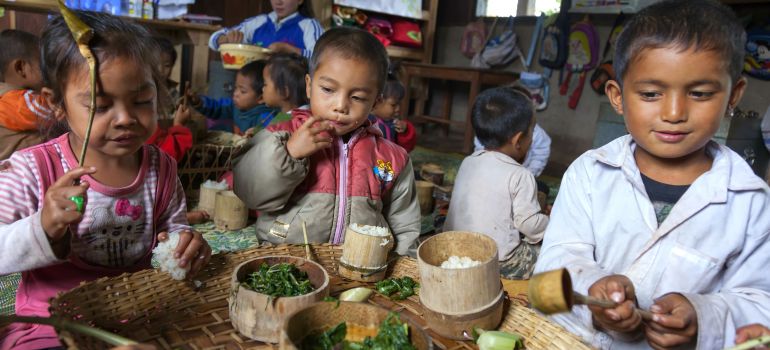Healthy meals in school

Related documents
Providing nutritionally balanced school meals with complementary nutrition education and health measures can deliver improved school performance, nutrition literacy as well as employment and income in later life. The procurement of food for schools from local farming communities supports farming households and livelihoods, and promotes sustainable local markets for diverse, nutritious foods.
The need for action
Most countries in the world provide school meals: at least 368 million children are fed daily in schools. However, few governments have adopted local procurement of food that would have multiple benefits for diets, agriculture and learning simultaneously.
“Nutritious and healthy school meals are good for children. The approach is good for their health, for their development and education. But next to providing and promoting the intake of healthy nutritionally balanced meals, school feeding programmes can also increase the demand for local farm outputs, and support a more efficient local food procurement and delivery systems” says Professor K. Srinath Reddy, Global Panel member and President of the Public Health Foundation of India.
While feeding children in school is not a new idea, recent policy innovations have expanded to focus on the delivery of healthy meals to children while at the same time stimulating agriculture through the procurement of food from local producers.
Some countries have already made significant progress in this area, such as Ghana and the USA. These include countries where national governments are consciously encouraging agriculture-education-nutrition synergies as part of a creative legislative agenda.

School meals for healthy children and healthy market
“There are many win-win situations in combining actions, from social protection to production,” says Graziano da Silva, Global Panel member and Director-General of the Food and Agricultural Organization (FAO).
Providing nutritionally balanced school meals with complementary nutrition education and health measures can support improved school performance, nutrition literacy as well as employment and income in later life. Greater policy emphasis is needed on this kind of multiple-win agenda.
The Global Panel’s Policy Brief
The new Policy Brief: Healthy meals in schools: Policy innovations linking agriculture, food systems and nutrition, explains why a greater policy emphasis is needed on the multiple-win outcomes of healthy meals in schools.
